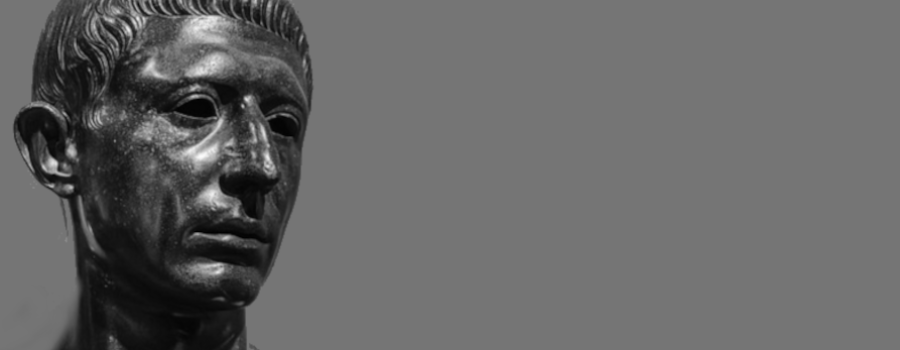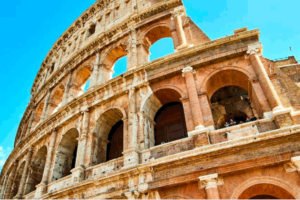Marcus Porcius Cato “Uticensis” (95 BC – April 46 BC), also known as Cato the Younger, was a powerful conservative senator from Rome. His conservative ideas centered on upholding what he perceived as Roman ideals that were in decline. He was a devout follower of stoicism. Cato had a significant role in Rome’s acceptance of Stoicism. He had strong integrity and a strong stance to tradition. As a result, he amassed a sizable political following. He used it to oppose extremely powerful generals of the time, such as Caesar and Pompey.
Marcus Porcius Cato and Livia Drusa’s son, Cato, was born in 95 BC in Utica, which is in modern-day Tunisia. He descended from Cato the Elder, who was the first member of his family to hold a political office. Cato the Elder was his great-grandfather. When Cato became four years old, he and his sister Porcia were orphaned and were sent to their maternal uncle. Their uncle was only with them for a short time before he too passed away. Then, it’s likely that another uncle took him and his sister to be raised. Cato was born with legendary tenacity. He was reportedly an extremely obedient and inquisitive child who was occasionally challenging but also somewhat slow to learn.
Cato the Younger played a significant role in this crucial period in Rome’s history. He was a favorite of the dictator Sulla as a youngster. He reached adulthood as Pompey was enjoying his brilliant military victories. But Cato’s relationship with Julius Caesar became the predominant focus of his life. Cato spent his entire career trying to stop Caesar’s ambition for power. He was the opposite of everything Cato stood for. Cato believed that Rome had become decadent and had forgotten its basic values. He desired to revive the orderly and disciplined Rome, which had actually been extinct for more than a century. Stoicism played a role in this revival of Roman ideals because Cato embodied it and lived by its principles.
Cato had a number of political positions prior to Caesar’s civil war. He received praise for managing Rome’s finances with integrity and without collusion. In 62 BC, he enacted regulations requiring generals to relinquish their armies while they were running for office. In 59 BC, he fought Caesar’s attempt to gain increased political power, with varying degrees of success. The following year, Cato traveled to Cyprus, and applauded for his transparent leadership. He was elected to political office on his return to Rome in 54 BC.
In 52 BC, he was successful in severing Pompey and Caesar’s alliance. While it may have appeared that Cato never supported actual civil war, he and his political supporters promoted a policy of confrontation with Caesar. This policy significantly influenced the outbreak of civil war in 49 BC. Even though he had previously opposed him, Cato declared his support for Pompey because he thought it was the only way to defend the republic against Caesar. At this juncture, Cato resigned from his position in government and joined Pompey’s military campaign, stationing himself in Sicily before leading a contingent of soldiers to his birthplace of Utica, where he remained until his defeat. Cato chose to commit suicide rather than pleading for Caesar’s pardon. He became a martyr and a symbol of the Republic as a result of his suicide.
His Stoic beliefs and Roman traditions, which were popular with both senators and the ordinary Roman voter, were the foundation of his political influence. Yet he received criticism from his contemporaries for being overly forceful in his opposition to Caesar. According to various reports, these efforts led to the outbreak of the Civil War.
His Teachings
Cato the Younger placed more emphasis on practicing philosophy than on writing about it. He led a morally upright life and wasn’t afraid of confrontation in the interest of justice and morality. At the conclusion of his life, he had to decide between compromising the integrity of his values and taking his own life. Cato the Younger decided to end his life. Long before Seneca, Epictetus, and Marcus Aurelius, it was Cato who established Stoicism as a respectable Roman philosophy by his actions.
Nonetheless, despite the rise in popularity of Stoicism in recent years, Cato the Younger’s name is rarely brought up. Given that Cato represented stoicism for several centuries, this fact raises numerous historical paradoxes. This amazing and accomplished man did not teach Stoicism. Instead, through his actions and deeds, he demonstrated how to live stoicism. He had a major role in advancing this, at the time, Greek philosophy into the center of Roman thought.
Stoicism’s development in Rome, from a reckless Greek philosophy to a respected Roman philosophy, was greatly aided by Cato the Younger during his life. The Roman school of Stoicism that Cato followed showed the Roman people the practicality of a philosophy that worked. Cato led a life of monastic simplicity in a time when Rome was awash in wealth and culture. He looked backwards to the ancient Rome he saw reflected in the Stoics’ way of thinking.
Cato studied activities that he could put to use right away. He went without shoes or hat in the rain and heat. He survived on the meager food of the poor or on no food at all. Cato learned how to be silent during illness, to be straightforward, to keep quiet, to think about hardship, and to think of losing everything.
He preferred that kind of life over the mansions and vineyards that wealthy men gave themselves. Cato did not prescribe to bribery and favors in the political system of that time, and it was reflected by his record. He led a life that was the counter to the decadence of his time. Cato the Younger was a living manifestation of Stoicism.
Influence
Since his death by suicide in 46 BC, Cato has had a significant impact. His association with the Stoic philosophy served as a cornerstone for his legacy. This was despite the conflicting ways that later Roman historians depicted his life. Negative critiques, prompted by his political activity, which ultimately led to civil war, are their main focus. Caesar won, and, as they say, the victor writes the history books.
Since the Middle Ages, Cato was exalted by a variety of sources through fictitious narratives and his inclusion in plays, the latter of which was popular before contemporary film and television. George Washington, the first President of the United States and the leader of American forces during the Revolutionary War, was an admirer of Cato. During an extremely harsh winter during that conflict, Washington and his troops amassed at Valley Forge. Washington gave the order for the men to watch the popular play of the period, Cato: A Tragedy, in an effort to boost morale. Cato, revered as a hero for their cause at a time when their morale was low. Washington, known as the “American Cato,” recognized the significance of the example set by this example of Stoic philosophy and Roman ideals.
Even though he isn’t as well-known as he was in the past, his influence on the American Founding Fathers, especially George Washington, has left a lasting mark on the modern world. And so, at a time when Stoicism is enjoying a resurgence, it is important to keep in mind how Cato the Younger brought a Greek philosophy to Rome by leading by example. Without him, the famed Epictetus, Seneca, and Marcus Aurelius would never have likely achieved any level of respect, and without his example, America might look very different today.









Most Commented Posts